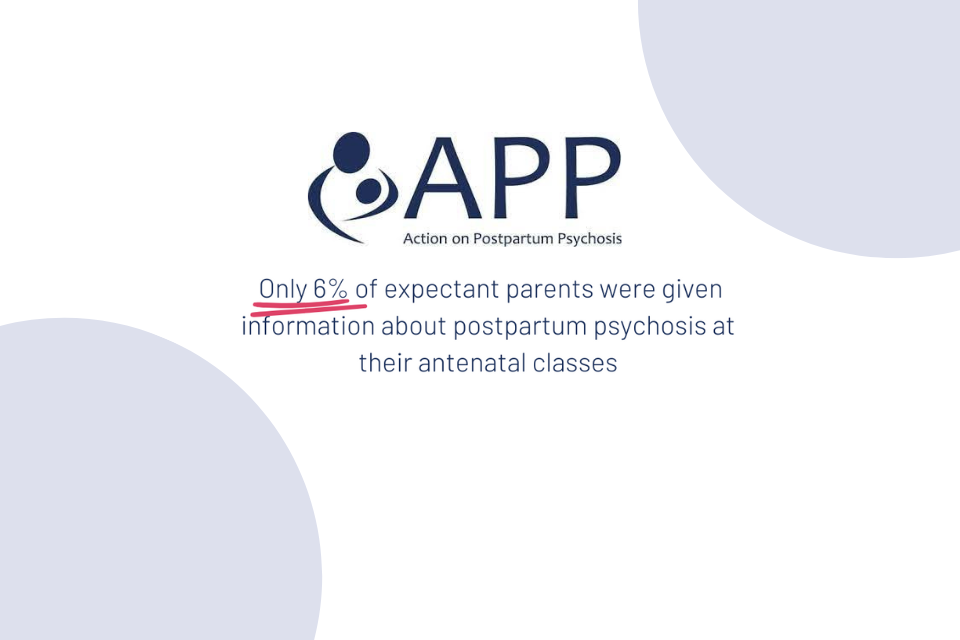Postpartum Psychosis is a severe postnatal mental illness affecting around 1 in 500 women. Naomi Gilbert, Campaigns & Policy Coordinator for the charity Action on Postpartum Psychosis points out that few parents are informed about the signs of the condition during antenatal education. She describes some of the concerns and asks maternity workers to contribute to a new survey on providing more information during the antenatal period.
_____________________________________________________________________________________________________________________________________________________________
Developing antenatal education resources on severe perinatal mental illness – share your views with Action on Postpartum Psychosis
This summer, the charity Action on Postpartum Psychosis is connecting with professionals who provide antenatal education across the UK to find out your views on talking to expectant parents about postpartum psychosis. You can find our short survey here https://www.surveymonkey.co.uk/r/33RX82J and lots more information about the project below.
Action on Postpartum Psychosis is a national charity bringing together families with personal experience of postpartum psychosis, perinatal mental health clinicians and world-leading researchers. We work to raise awareness of postpartum psychosis, carry out research, and reach families across the world through our web information, social media and online peer support forum with over 4000 members. In the UK, we provide one-to-one support for women, partners and grandparents – alongside regional cafe groups for women who have experienced postpartum psychosis to meet each other online or in person.
Mums and families supported by APP frequently tell us they wish they had known about postpartum psychosis (PP) before it happened to them. Partners or family members are often the first to realise that something is very wrong, but don’t often have the language to describe the symptoms they are worried about to health professionals, or the awareness of how to get help. The rapid escalation of PP means that family members often experience significant trauma through witnessing distressing symptoms. Delays in seeking help can mean that women are admitted under the Mental Health Act, often involving emergency services such as A&E or the Police.
We also know from talking to health care professionals during APP training that postpartum psychosis can be a difficult and taboo topic. Many professionals we have trained talk about their own fears, lack of knowledge and minimal experience of working with mums who have had PP. In our preparatory work for this project, we talked to the RCM and learned about the impact of current workforce pressures in midwifery and COVID on antenatal education provision. The NCT talked to us about curriculum and time pressures in groups, and the balance of giving enough information to empower expectant parents without increasing anxiety or fears. However, we found that mild to moderate mental health difficulties in the perinatal period are often discussed antenatally.
APP Ambassador Hugo White recently recorded a live chat for dads affected by postpartum psychosis https://www.youtube.com/watch?v=IacknoAEkKQ highlighting the need for dads to have some basic information on PP so they can get specialist help as soon as possible.
Hugo says:
““If someone had given the bullet point list of postpartum psychosis symptoms, that probably
would have been all that we needed to pick up on it quicker. I can’t believe we weren’t in
hospital earlier…”
Around 1400 women and their families are affected by postpartum psychosis (PP) every year in the UK (that’s 1 in every 500 births). 50% will have had no previous mental health difficulties. Postpartum psychosis often escalates quickly, and rapid admission to hospital is required for the safety of mother and baby. Suicide is the leading cause of maternal death in the UK and a significant proportion of these suicides are due to postpartum psychosis. The Government has committed to halving maternal deaths globally by 2030 but as yet, no progress has been made.
For these reasons, APP believes that every expectant parent has the right to know about postpartum psychosis so they can access urgent help and specialist support. We carried out a YouGov survey in 2021 which found that just 6% of expectant parents had heard about postpartum psychosis during antenatal classes. You can help us to make sure parents are aware, prepared, and able to reach out for the urgent help they need. We want to hear from all professionals and organisations who provide information during pregnancy. We want to know how you feel about discussing postpartum psychosis with expectant parents. Your views will help us to develop antenatal education resources on postpartum psychosis at the right level for the families you support.
Please complete our brief survey to share your views:
https://www.surveymonkey.co.uk/r/33RX82J
We would be really grateful if you can share with your networks to ensure we hear the views of a wide range of professionals and organisations. We look forward to hearing from you!
Naomi Gilbert, Campaigns & Policy Coordinator
Action on Postpartum Psychosis



